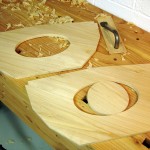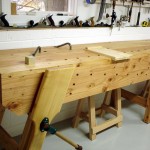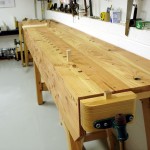Now that the workbench is done, it’s back to the Fiddlhead. We left off with a stack of resawn cedar.
Harry wants the bulkheads made up by laminating 1/4 inch thick pieces, making each bulkhead a 1/2 inch thick two ply board. Back when I did this for the model, my first result was a pair of bulkheads that curled up like potato chips. Learning from that, I took a more cautious approach. I resawed only to 1/2 inch thickness, not all the way to 1/4. I then did the lamination in two stages, edge to edge first, and then face to face.
 The shop is not normally heated, and this week was very cooperative with overnight lows that did not reduce the shop below the 60 degrees needed for West System epoxy. After laminating, I planed both rough boards to near-final thickness; quick work for the big #7 plane. The elipses for hatch openings were cut with a fiddly old coping saw that’s now headed for the trash. Finished with a cabinet maker’s rasp. Handling these, I now appreciate Harry’s intent. They are unbelievably light, much lighter than they would be if made from regular 1/2 inch plywood. The cross grain lamination adds strength over using raw cedar.
The shop is not normally heated, and this week was very cooperative with overnight lows that did not reduce the shop below the 60 degrees needed for West System epoxy. After laminating, I planed both rough boards to near-final thickness; quick work for the big #7 plane. The elipses for hatch openings were cut with a fiddly old coping saw that’s now headed for the trash. Finished with a cabinet maker’s rasp. Handling these, I now appreciate Harry’s intent. They are unbelievably light, much lighter than they would be if made from regular 1/2 inch plywood. The cross grain lamination adds strength over using raw cedar.
The round piece shown in one of the openings is part of a hatch cover, another clever device that Harry designed. Clever, but devilish to construct.
Update – Nov 11, 2008: In only a couple of days these bulkheads have acquired a warp. They didn’t turn into potato chips, but have about 3/32 inch of curl. I don’t like it, but will leave them as they are. It’s probably not enough to make the boat tend to the left.
 Update – Nov 20, 2008: More curl. They’ll be potato chips soon! A pencil can be rolled under either of two raised corners. I really don’t want to rebuild these, and I want even less to substitute plywood. I wonder what would happen if they got a good overnight soaking and then dried out under weights. Then again, it probably doesn’t matter that they are warped. The critical edge, the bottom, is still straight.
Update – Nov 20, 2008: More curl. They’ll be potato chips soon! A pencil can be rolled under either of two raised corners. I really don’t want to rebuild these, and I want even less to substitute plywood. I wonder what would happen if they got a good overnight soaking and then dried out under weights. Then again, it probably doesn’t matter that they are warped. The critical edge, the bottom, is still straight.




